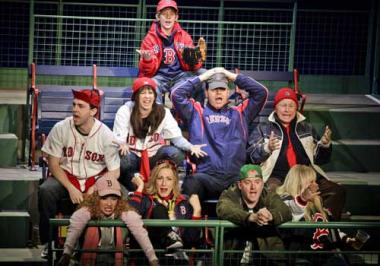I’m not a native New Englander, but I’ve been a Red Sox fan long enough to have had my heart broken in 1986, when an impossible series of errors cost them the World Series and for many fans confirmed, yet again, the intractability of The Curse. The Sox’ 86-year championship drought, from 1918 to 2004, is traditionally attributed to the sale of Babe Ruth from Boston to the New York Yankees in 1920.
But the world-premiere musical now playing at the American Repertory Theater in Cambridge posits a different and more fitting cause: the intractable racism that infected the team for decades. For all its sober message, Johnny Baseball is a high-spirited, heartfelt and thoroughly delightful show, a musical in an old-fashioned mold that will charm Sox fans and unbelievers alike, and maybe even the odd Yankee rooter.
To highlight the ballpark theme and get the audience into the spirit, A.R.T. has added a Yawkey Way—full of side attractions, including a hot dog stand on the patio, souvenir rubber baseballs for ticketholders and long lines at the beer booth. And onstage, the flexible set, featuring a pair of green (of course) rolling platforms that represent the Fenway stands and other locales, also includes cameo appearances by the right-field scoreboard and the Citgo sign.
Johnny Baseball mixes the historical facts of the Red Sox’ record on race into a fictional story. It begins in 1919, when the seeds for the Curse are sown with the arrival of Johnny O’Brien, a young phenom who earns the nickname Johnny Baseball for his devotion to the game and his killer fastball. Later it moves to 1948, when events provoke a quite literal curse laid upon the Red Sox and their city. This “real” story behind the Curse is related to a 10-year-old fan (Erik March) by an elderly black man (Charles Turner, bearing a perhaps not coincidental resemblance to James Earl Jones in Field of Dreams).
The story is told in flashbacks during the agony and ecstasy of the fourth game of the 2004 American League Championship Series against—who else?—the Yankees, when something that sure looked like divine intervention broke the Curse and propelled the Sox toward their long-delayed championship. In a sequence of hilariously apt vignettes and musical numbers, a gaggle of Fenway bleacher bums live every desperate moment of that fateful 12-inning contest, lofting prayers and extravagant promises heavenward if they can get just “One More Run.” There are stories within stories here, including the man who trusts in his lucky Cracker Jack box and the young woman who is getting fed up with her long-term boyfriend, who refuses to propose until the Sox win a Series.
According to Johnny Baseball‘s creators, Robert and Willie Reale and Richard Dresser, the roots of the Curse are found in the white ballplayer Johnny’s love for Daisy, a beautiful black singer. In a segregated sport in a racist town, their forbidden love puts his promising career in jeopardy. Though Johnny stubbornly insists “It’s a free country,” Daisy knows from experience in black America that “It’s more complicated than that.”
Colin Donnell and Stephanie Umoh are attractive young performers with strong voices and a sweet chemistry that makes you root for their impossible love-at-first-sight story. Their impassioned duets alternate with raucous comedy numbers from the bleacher fans and ballplayers that recall the “Ya Gotta Have Heart” team in Damn Yankees.
Charl Brown is affecting as a younger-generation phenom standing in Johnny’s shoes on the pitcher’s mound—”a circle in a diamond”—and Burke Moses gives an amusing, gravel-voiced portrayal of the boozing, whoring, bigger-than-life and (in this version, anyway) likable Babe, who joins with Johnny and a gang of barflies in a number celebrating their origins as abandoned orphans, “Brotherhood of Bastards” (“If our mothers had been sober, we’d none of us be here”).
These two and the rest of the versatile 10-member ensemble take on multiple roles, and an eight-piece offstage band provides solid backing. Some of the curveballs thrown by the plot are strained, but the show’s founding notion, that the Curse was not some byproduct of a foolish trade but a richly deserved reprisal for the team’s history of arrogant bigotry, is refreshing and compelling.
There’s something about baseball—its long, flowing history for one, and perhaps the game’s structure of quiet tension building to bursts of action—that makes it the stuff of legend like no other sport, and the stuff of fiction and drama as well. Johnny Baseball, a solid addition to those ranks, is an extra-base hit.
Johnny Baseball: American Repertory Theater, Loeb Drama Center, 64 Brattle St., Cambridge, through June 27. (617) 547-8300, www.AmericanRepertoryTheater.org.



